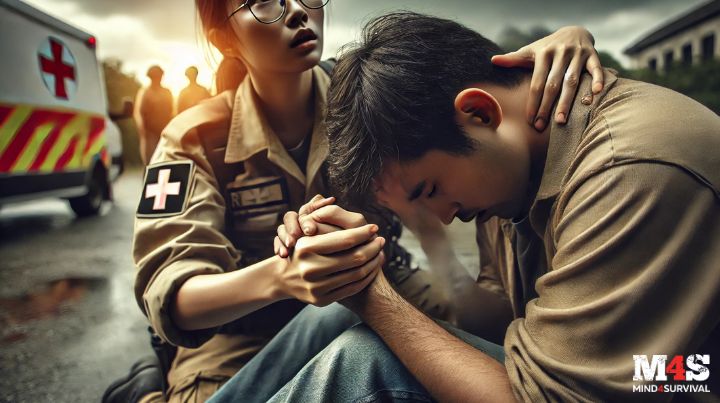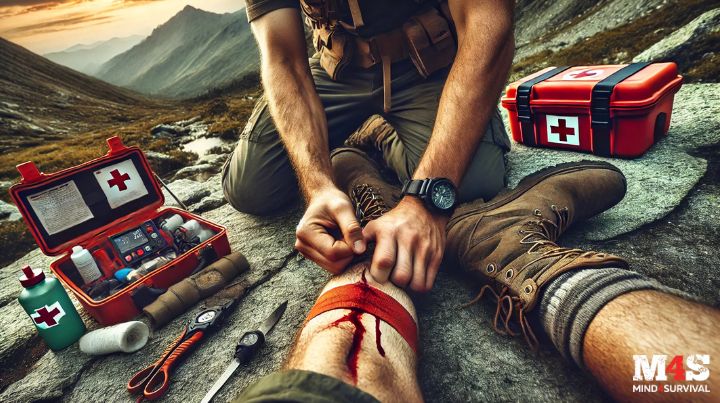Podcast: Play in new window | Download
When disaster hits, the first few minutes can make the difference between life and death. Imagine being the only one around when someone collapses or is bleeding badly—no one wants to face this situation unprepared. Knowing what to do isn’t just valuable; it’s a responsibility we all share. Here’s a rundown of essential medical training for preppers that can save lives when seconds matter.
Quick Look at What You’ll Learn
Emergency Bleeding Control
To start with, a person can bleed to death in minutes. Knowing how to stop massive bleeding is crucial. Techniques like using a tourniquet, applying direct pressure, and packing wounds are the bread and butter of emergency bleeding control. Whether it’s a car accident, workplace mishap, or something more severe, this training helps you take quick action before medical help arrives. Consider it an insurance policy for life-threatening situations—having the right skills on hand can truly mean the difference between life and death.
To learn more about bleeding control techniques, visit this training resource.
Here’s a Great Article About Prepping for Massive Bleeding Scenarios
Basic Life Support (BLS)
Nest is Basic Life Support teaches you how to perform CPR, use an AED, and handle airway obstructions. In a crisis, when someone isn’t breathing, or their heart has stopped, you’ve got about 3-10 minutes to act before permanent damage sets in. BLS training covers the skills to keep oxygen flowing, potentially preventing brain damage or death. With practice and proper instruction, you’ll build the confidence to respond swiftly and make a real impact.
Check out this BLS course to get certified.
First Aid
Let’s face it: you’re far more likely to deal with cuts, sprains, or burns than anything else. Basic first aid covers these situations, while advanced first aid goes deeper into injury management and longer-term care—skills that become vital in a long-term emergency or grid-down scenario. From splinting fractures to treating hypothermia, this is your toolkit for the every day and the unexpected. Having these skills isn’t just about self-reliance; it’s about being a resource to your community when things go sideways.
Find local basic first aid courses here or look into advanced first aid options.
Trauma Management: TECC and TCCC
When the stakes are high, trauma care can’t be overlooked. Tactical Emergency Casualty Care (TECC) and Tactical Combat Casualty Care (TCCC) courses are designed for emergencies that require a more advanced trauma management capability. You’ll learn how to treat severe trauma, manage airway issues, and handle shock—all under high-stress conditions. These courses are especially valuable for those who want to be prepared for not just everyday accidents but for the chaotic aftermath of events like terrorist attacks or active shooter situations.
Here are courses in:
Wilderness First Aid
Sometimes, nature isn’t so forgiving. If you spend time outdoors—or plan to bug out in the wilderness—wilderness first aid teaches you to treat injuries when you’re miles from help. It focuses on improvising treatments with limited supplies, making it a smart addition for preppers who like to venture off the beaten path. Think of it as a blend of survival and medical skills—because you’ll need a little of both in the wild.
Explore wilderness first aid courses here.
Psychological First Aid

Let’s not forget that medical emergencies can also take a toll on mental health. Psychological first aid equips you with the skills to offer emotional support and guidance during times of stress. Learning how to calm an anxious person, recognize signs of trauma, and provide a sense of safety can be just as critical as treating a physical wound.
Explore psychological first-aid training to help those dealing with emotional trauma during a crisis.
Why It All Matters
If an emergency strikes and you’re on your own, your training becomes your lifeline. From massive bleeding to heart attacks, knowing how to act swiftly can give you the upper, life-saving hand. The time and effort you put into learning these skills aren’t just investments in your safety. They’re steps toward saving someone’s life when it counts the most. It’s not about becoming a medical expert overnight but about knowing enough to make a real difference when every second counts.
The Bottom Line on Emergency Medical Training
Please don’t wait until it’s too late. Start with a course that suits your current skill level, then gradually build up your medical knowledge. The more you know, the better prepared you’ll be for any situation. Click the links throughout this article to find courses and start training today.
While you’re at it, share this article with others—preparedness is best when it’s a community effort. Let’s ensure that, no matter what happens, we’re ready to face it together.
Are there any specific training programs you’d like to add to your skillset? What courses have you already taken? Let’s hear your thoughts in the comments below!
Stay safe,



